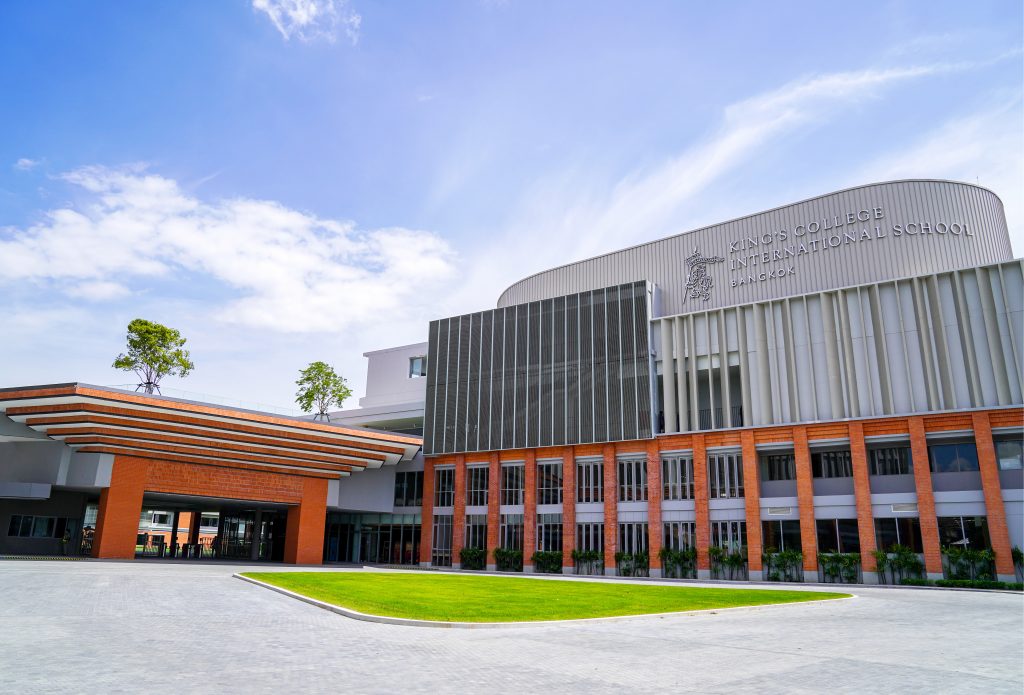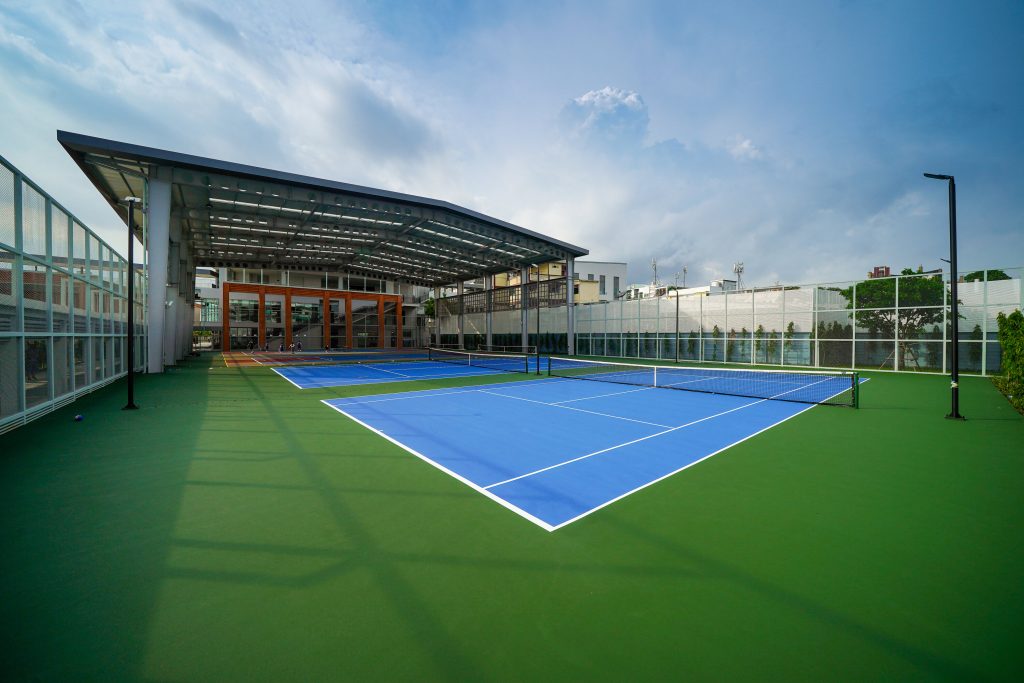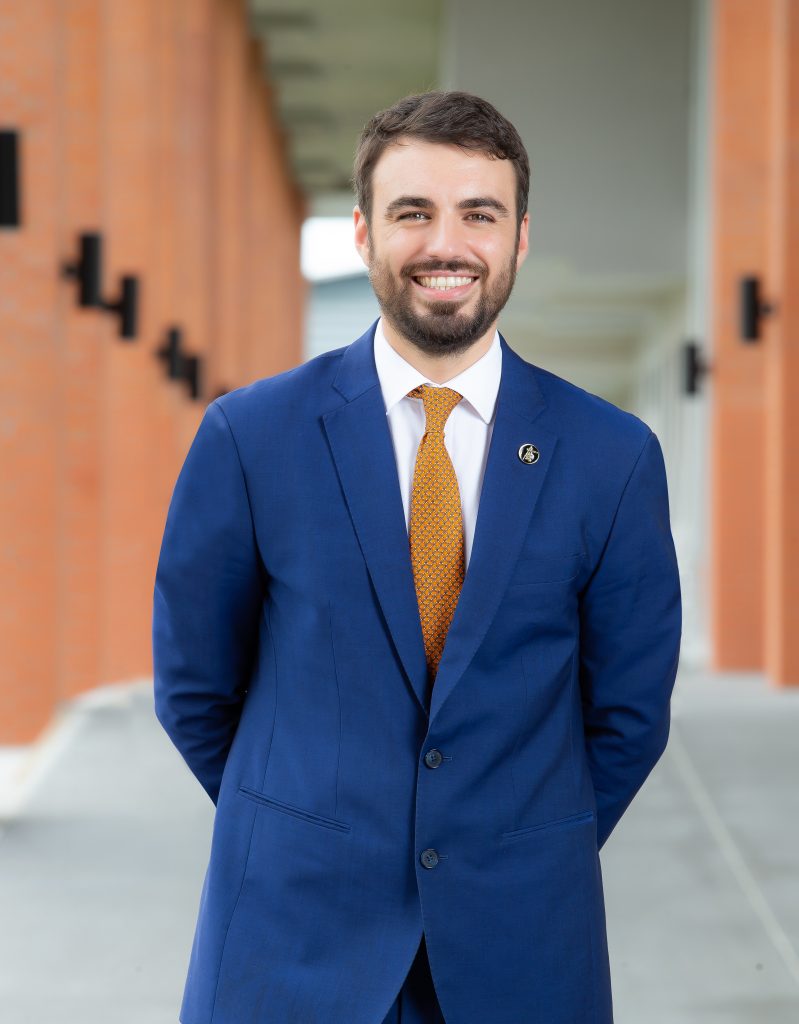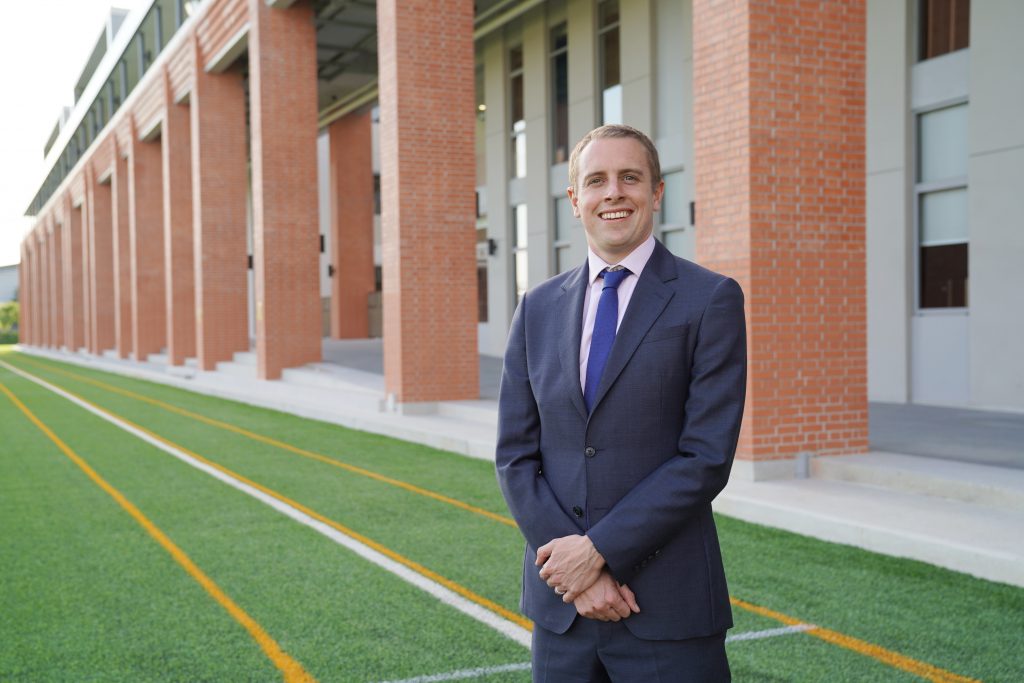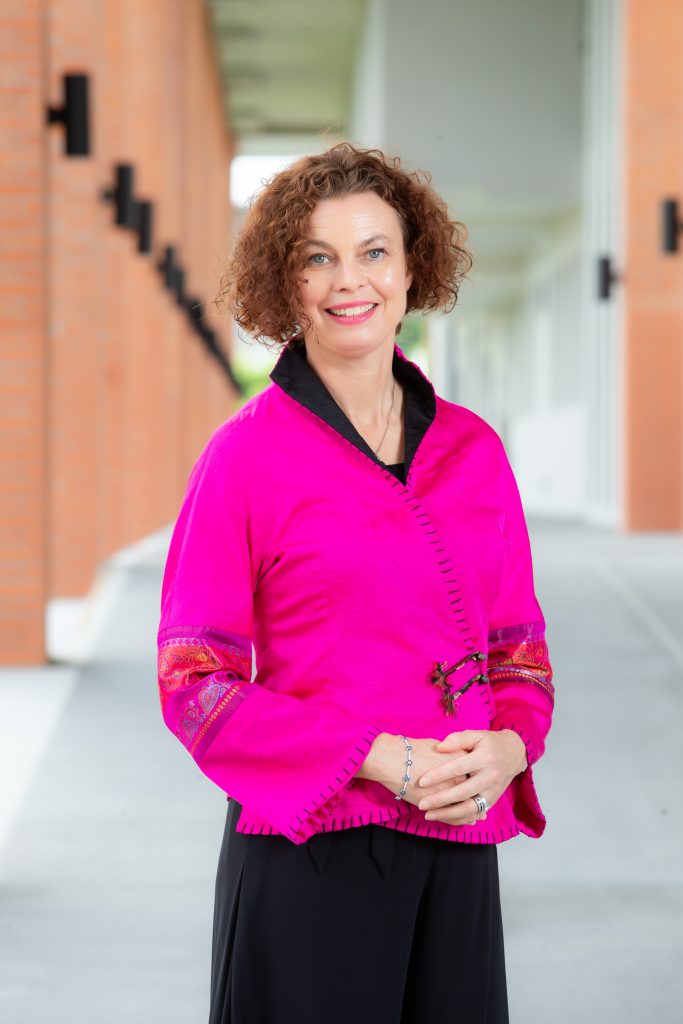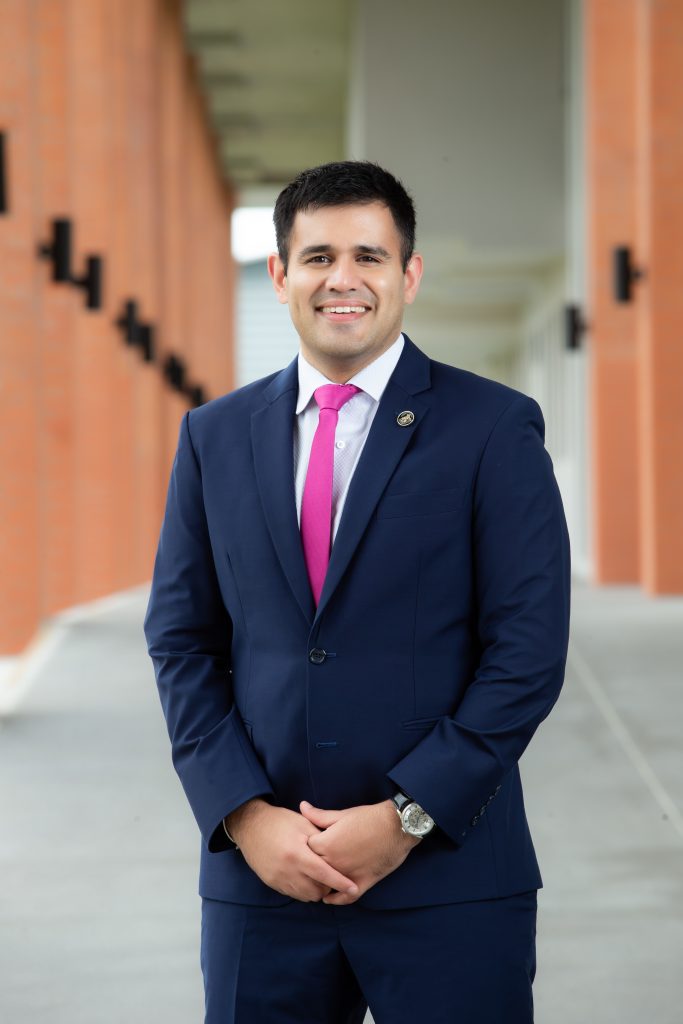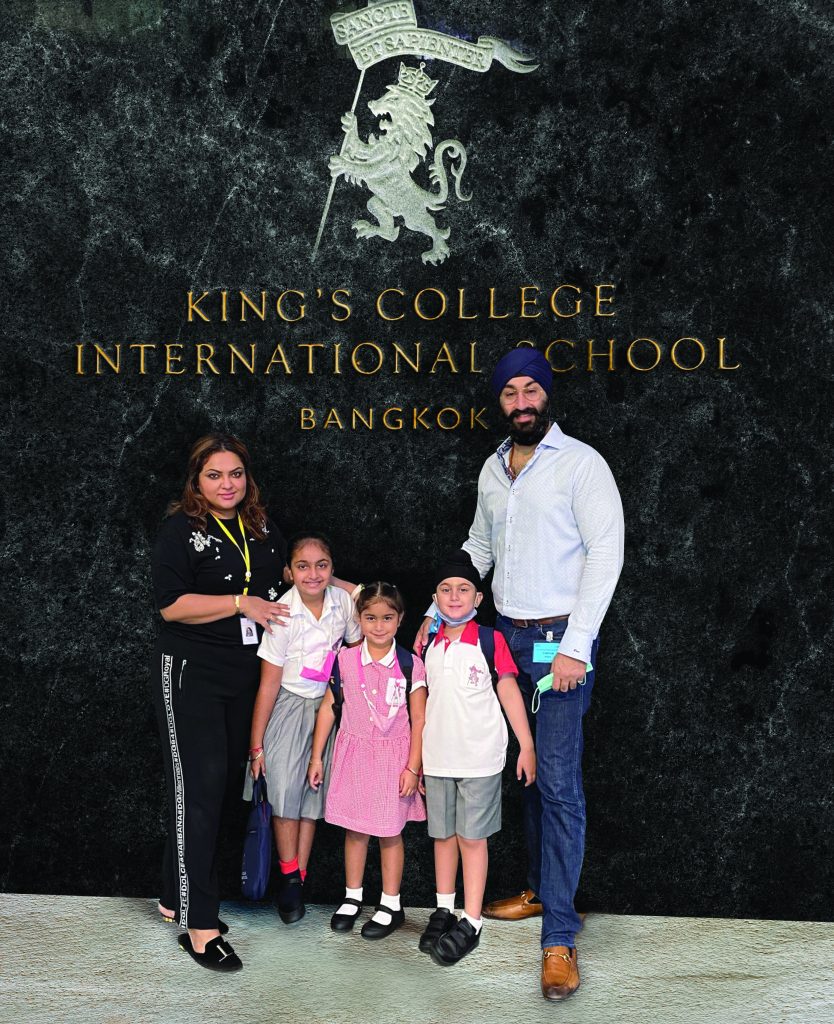Thai-Indian parents of King’s students also weigh in.
King’s College International School Bangkok, which opened in 2020, has since become one of the most prestigious schools in the country with the support of one of the most academically successful schools in the world, King’s College School, Wimbledon. While academics are important, the central focus of education at King’s Bangkok has always been to provide a loving community to their students, instilling in them the values and skills needed to succeed in the future.
With a state-of-the-art campus designed by leading architects, and support from the parents and staff of King’s Bangkok, the school boasts over 42,000 sqm of world-class facilities and technology which help to foster creative, healthy, well-rounded students. These include a vast array of facilities for Art, Music and Drama; they offer a 625-seat auditorium, concert hall, dance studio, art studios and multiple music rooms. Additionally, their Sports Centre consists of more than 2,000 square metres of shaded recreational facilities for students’ optimal social and physical development in any weather. There you can find: a Fitness room, a Gymnastics centre with an Olympic-standard floor; and an air-conditioned Sports Hall housing three full-size basketball courts, an indoor jogging track and 7-metre climbing wall. Students can spend their time in a saltwater swimming pool that is sheltered, Olympic-size (50M); gain valuable experience in a team working towards a common goal on the FIFA- Quality Football Turf; or explore the many other sports on offer in the space. At King’s Bangkok, each child is able to develop socially, mentally and physically, while receiving encouragement to pursue new passions and try some of the numerous activities there are on offer.
The Senior Leadership Team of the school speak to Masala about what makes King’s College stand out, and how they’re dedicated to building their students’ future.
THOMAS BANYARD
Headmaster
Thomas Banyard graduated from Oxford University with a first- class degree in Physics before he pursued a PGCE in Education, becoming a teacher at Tonbridge School, a top UK boarding school. From there, he was promoted to head of Physics at King’s Wimbledon, after which he moved to Hangzhou, China to develop one of their first international schools, the RDFZ King’s College School Hangzhou. He is now leveraging his experience to develop King’s Bangkok into one of the nation’s leading institutions.
The King’s name is associated with a very high quality of education, how do you ensure this?
The strength of any organisation depends on a shared vision, so we are very lucky to draw on a huge number of different supports. The King’s Wimbledon team works hand in hand with us in every area, including: the Education Committee, the International Team, and our Governing Board, made up of Heads at Wimbledon, who make sure we are working collaboratively.
The results of a recent formal quality audit by King’s Wimbledon were outstanding. Could you please share these with us?
At the end of the first term, the satisfaction rate was very high, at about 97 percent. The key audit involved online interviews and surveys that totalled over 80 pages of feedback and the results were overwhelmingly positive. I believe this can be attributed to several factors.
Firstly, our name is recognisable and our location makes us very accessible. Although we are only in our second year, we had so many people place their trust in us at the beginning and who are still supporting our journey. We have been very lucky to have really enthusiastic parents on board and they actually do a lot of the recruitment for us.
We are also very multi-cultural; we have over 28 nationalities represented at the school. Our entire team is very like-minded as well. Recruitment is handled by the same people with a similar set of interests, so we have ended up with a really lovely group of staff.
King’s recruits only a handful of teachers from a pool of thousands, with applications more than doubling with the introduction of the Senior School. What can we expect from this highly selective process?
One of my jobs is to make sure the right people are part of our community. Unfortunately, in any society, there are always going to be rude, unpleasant people who will have a knock-on effect, so we feel it is very important to do our best to remove this from our community. We want people on board who reflect our values because we want these children to have a consistent viewpoint, which will make a real difference when they graduate.
Over the past two years, we have received upwards of 6,000 applications, I think due in part to the King’s name and this incredible city. Beyond having degrees from good universities and credentials from top schools, the candidates we look for are those who have had stability in their careers, who have shown commitment to their previous schools. We value individuals who can adapt their practice to a different culture, who motivate their colleagues, value children as individuals, and so forth.
Post-interview candidates have to present lesson plans to our Heads of School. This stage is followed by a third and final round with King’s Wimbledon. This rigorous process allows us to find amazing candidates and from the results, you can see that the system works extremely well.
Can you walk us through some significant changes that have taken place this past year?
We have developed an online system that really suits this ‘new normal’ life we have been living. We built a fitness centre and new cooking classroom; we are building a sixth building, extending one of our buildings upwards and adding more classrooms, a Black Box Theatre, and a gymnastics room. Honestly, our site was future-proofed already because we have so much space, but we were lucky to have the full support of upper management to move big projects forward without compromising on quality.
What about King’s do you believe makes it appealing for Indian parents?
I believe Indians view education very much in the same way as we do in the UK: as character education. We want students who are well- rounded, who respect our values, and are happy. I think a lot of Indian families come here because they trust that we have a community that supports them.
We are also ready to deal with any issues that come up. Sometimes children may say the wrong thing; things that are racist or that can be considered bullying — and parents want to rest assured that we will address things proactively. We are an international school, so having different nationalities is something we focus on and celebrate within our community. We communicate openly when things happen so that children feel safe and confident to come to school. We care about each other, so we run more as a family than just a business. It is hard to market things like kindness and strong values, but those are the things that are important to us.
As Headmaster, what are some goals you have for the school in the long-term?
My primary goal is maintaining our personal touch. Making sure that our teachers do not change their values and we do not lower our standards. We will continue working harder than ever to keep that sense of community thriving, to make sure new parents and students who join our school feel supported and integrated into the community. We have succeeded so far, and I have every confidence that we will continue to do so in the future.
MATTHEW GIBSON
Deputy Head (Senior School)
Matthew Gibson is responsible for the academic development and pastoral welfare of the Senior School’s pupils. Prior to his role at King’s Bangkok, Matthew completed a Bachelor’s degree in Biochemistry at The University of Nottingham before pursuing his PGCE at King’s College London. He then spent 10 years at King’s College School, Wimbledon before moving to Thailand.
What motivated you to join the King’s team and move to Thailand to develop the campus here?
I loved every minute of my time in Wimbledon and my decision to move here stemmed from wanting an opportunity whereby I could still get to work in the same kind of supportive environment, but on a brand-new project that had a lot of scope.
It was an exciting opportunity to be able to take all the best bits of King’s Wimbledon and adapt them for a completely different student body, and the thought of living in a thriving metropolis like Bangkok was also exciting.
From all your experiences gained working on the Wimbledon campus, how are you hoping to develop King’s Bangkok into one of the best schools in the country?
We are continuing to work very closely with our partnership school in Wimbledon. We want our curriculum here to be similar, offering the best bits of what we know works in Wimbledon, but we have adapted it to suit our local clientele.
Some highlights include our tutor groups system and assisted reading programme, both of which allow students from different year groups to mingle, mentor, and learn from each other. We are looking to bring in mentoring systems where older students in Wimbledon can engage with some of our students here. In a similar vein, we are exploring the possibility of teachers in Wimbledon doing remote sessions with students here so they have even more brilliant voices to listen to.
One of Wimbledon’s flagships is the co-curriculum programme. We have developed a really exciting and diverse ECA and CCA programme that allows students to make a difference in the school community and to interact with the wider community as well. Once we get back on site, we are looking to have events with FOBISIA and carry through with our school fixtures. There is a huge number of exciting things happening!
As Deputy Head of the Senior School, you help students with their final pathways. How does the King’s experience help open doors for students after life on campus?
How King’s sets students up for life is the most important thing. To go to the best universities, students need to be all-rounders. Therefore, beyond excellent academic results, we give them opportunities to learn interpersonal skills, foster the ability to present their work and liaise with other students, and to involve themselves in all sorts of pursuits.
Universities understand that the type of student that the Kings’ family produces are all-rounders, problem solvers, critical thinkers, so of course we are fortunate to have that association, but the main thing is that we prioritise our students’ development of skills that really make them stand out.
At King’s, we introduce our careers programme from as early as Year 7, where students begin meeting with tutors to consider different careers. In Year 10, we start career profiling, where we do a number of psychometric tests and follow up interviews with specialists who can help link a student’s skills with careers that might be interesting. This drives conversation with the tutors as well, all of whom are very knowledgeable about the university system, so we can make sure that their final pathway is fit for them and is supported by the options they are taking.
Bangkok is home to many top-tier schools, what makes King’s Bangkok unique, in your opinion?
We are very grateful for the high standards that the other international schools maintain because in order for us to be successful, we have to be exceptional. I believe what makes us stand out is our focus on developing the all-round student. So while we value academic excellence, we also encourage students to get involved in every area of school life, to develop their soft skills, their empathy, and their understanding of the world around them.
HELEN SEARLE
Head of Primary School
After graduating with a BA (Hons) in South East Asian Studies and Malay from Hull University, Helen Searle pursued a PGCE, and then later an MBA in Educational Management. Helen has taught in both the UK and Kuwait, with senior
posts in three large British schools. The allure of helping to start such a prestigious school from scratch drew her to joining King’s College International School last year.
Based on your extensive experience teaching in a variety of British schools in the UK and abroad, what makes King’s College International School stand out compared to the others?
We’re very closely affiliated to King’s in Wimbledon; we’re a sister school as opposed to a franchise school. We have frequent meetings with King’s Wimbledon on our curriculum and policies, they conduct a thorough audit with us every year, and they interview parents, students, and staff, so it’s very much a partnership. A real strength of the school is that we take the best of King’s Wimbledon, but we tailor and enhance it to the environment and children that we’ve got in Bangkok.
On top of that, we’ve got the most fabulous facilities, and a values-based education which focuses on children’s wellbeing, and links with the Thai values of kindness, good manners, and wisdom. That’s central to what we believe; not just academic achievements, but also the pastoral side and the extra-curricular side.
Based on your previous experiences, what are the advantages of having such an international and diverse student body?
These days, wherever you are, you’re living in a very multi-cultural society. It’s valuable to know how to mix with different people because chances are, when you’re going out into the workplace, you’re going to be working with people from a huge variety of backgrounds.
There are probably more international links over the internet than we’ve ever had before, which helps make the world more tolerant and understanding. In a globalised world, that’s really valuable, and children who haven’t had that experience have missed out.
As the Head of Primary School, what are you looking for when hiring teachers, not just in terms of experience, but also in nurturing the younger students?
Teachers are, along with the students, the most important thing that any school has, so it’s very important to get them right. Just because a teacher has a lot of experience doesn’t make them a better teacher. So many say they enjoy working with children to track the data, but to me, that’s not what’s important – it’s loving children and having that passion for working with them.
King’s College has recently expanded to include Secondary school, Years 7-10. In what ways do you believe it would help students moving on from King’s Primary School to attend the Senior School at King’s?
We heads of school work closely together to ingrain the philosophy of the school from early years all the way through, so those skills for later on in life are really being fostered. One of the things that we also work on is involving families and communities, so the students feel that they’re part of the school and they belong to something special. We’ve got a good ‘Parents of King’s’ group as well, which organised events for parents during the online learning period, such as yoga sessions and mocktail nights, so it’s not just a school; it’s a part of your life.
Last year’s move to an online learning model was difficult for many. However, we’ve heard that the teachers at King’s Bangkok have made it easier and in fact more fruitful for the parents than expected. How did you achieve this, and do you have any examples of the teachers’ initiatives?
When I wrote the online learning policy for the school, we developed a system in which we put extra staff in classes, so we can work with small groups of children and keep lessons personal. There’ll always be an adult with maybe six children at a time, so we can see exactly what they’re doing, and they can show us their work; we also ensure they aren’t on the screen all day long. In Early Years, we even offered an opt-out for the really little ones in nursery and pre-nursery if they didn’t want to continue with online learning, though a lot of them chose to continue, because our staff did some really fun things with the children.
We also have social time built in, so it’s not just all academic work and no play, with the opportunity for parents to catch up with the teacher each week if they want to. We’ve also sent packs home for parents with a variety of resources to enhance the learning.
RAJ LADVA
Head of Early Years
Raj Lavda originally hails from the UK, but he has called Thailand home for 10 years and married into the Thai- Indian community, with the unique insight that brings. He completed a Bachelor’s degree in psychology and a PGCE in primary education,
with an NPQ in Middle Leadership, and has also had experience in developing curricula both in Thailand and abroad.
What drew you to join the team at King’s College International School?
I was really interested in the King’s brand, but the thing that really inspired me to join King’s was meeting Tom Banyard, the Headmaster, because he’s such a positive person and he really believes in what we’re doing. What you want when you’re working for somebody is to get a sense that they have long-term plans and goals, and that we’re here to make a lasting impression in the community.
You’ve had a lot of experience with developing curricula in both Thailand and the UK. What do you believe makes the British curriculum, and specifically that of the Early Years in King’s College, stand out?
What it all comes down to is the fundamental purpose of the child as the centre of the curriculum, which is what is needed if we want to produce people who will run our economy in 20-30 years.
Why I think the British curriculum is one of the best is that it has been science-backed for quite a long time. Viewing children not just as individuals that we can shove information into, but as people who have skills to develop, is for me very powerful and that’s what we’re strong at here at King’s. What I’ve been coining with the teachers here in Early Years is a curriculum for the community, one that focuses on our children as individuals with untapped potential, but also that helps them understand the community that they’re part of.
Were you always interested in Early Years education?
I have been in childcare for a while, and I was in an Early Years unit for around a year and had the best time working with 3-5 year olds. For me, Early Years has always been the most important part of my teaching. My background is psychology; I’m fascinated with how our brains develop and the impact that Early Years education has on that. The biggest changes in our brain development happen from birth to age five, so if you get their education right at that time, the changes that happen during adolescence will be much more positive.
Based on your experience with the Thai-Indian community in Thailand, what do you think King’s College offers that is uniquely attractive to Thai-Indian and Indian families?
The Thai-Indian and Indian community here is very strong and very social; it’s part of the fabric of Thailand. What you’re seeing in the community is people looking outwards now; they need their kids to have a global outlook. Here at King’s we will enable your children to be independent and confident with whomever they meet and the connections that they will form. On top of that, King’s is going to have great networking opportunities in the same way that a lot of other big international schools do.
It’s also about the prestige – I’ve never seen a school’s marketing video get 1.3 million likes on YouTube, but that’s happened twice! Normally, schools are really secretive about their fees, but in some ways, we don’t hide at all, and that allows people to understand how much we’re willing to invest in their children’s education.
How does King’s College instil the right attitude to learning in children from such a young age?
Our school values – kindness, good manners, and wisdom – have been very well-embedded from the very beginning. Even in the interview process for new teachers, if they’re not genuine people with a kind and caring nature, then we’re not really interested. That’s one thing that I would say of our whole community of teachers here: they’re all incredibly good people.
Our campus is also absolutely beautiful, and I’ve seen quite a few. For me, what we have in Early Years particularly is not only classroom spaces, but shared spaces where children learn together; the design is all about collaboration and community. There’s a real sense of openness and the campus reflects that.
What advice would you give to parents who are choosing schools for their children to join, especially those with young children who are just beginning school?
Fundamentally, if your child is an Early Years child, you have to think about what is important for you as a parent. Independence for me is key; it helps children feel confident, happy, and become more of themselves. Out of independence comes confidence, and out of confidence comes achievement. So here at King’s, we’re really clear with parents about how we work to instil independence, structured within the good values that we’re promoting.
I would go and visit as many schools as you can. As parents, no one knows your children better than you do. See what your instinctive response is: are the people warm? Do you get the sense that your kid is going to feel happy in that space? Can the teachers explain to you passionately why your child’s learning is going to be fun? In my opinion, what we do really well is we readily offer that sense of welcome, of kindness, of community.
How involved are you in the admissions process?
I’m very involved – I meet all the children in Early Years admissions; it’s part of my role. Basically how it works is this: your child gets to play for half an hour, in a classroom that’s set up beautifully to meet their interests and needs, and I get to play with them. The parents have their interview with Tom and with admissions; after that we have a conversation about it and decide if we are a good fit for your child and vice versa.
Masala also interviewed the parents of some Thai-Indian students currently attending King’s College about their experiences:
RACHNA KHANIJAUN and DHAMMANDEEP SINGH KHANIJAUN
Parents of Niara Kaur Khanijaun, Niwaaz Singh Khanijaun and Nivaasa Kaur Khanijaun
What was it about King’s College that convinced you that it would be a good investment for your child’s education?
Education is the most essential tool to build a child’s foundation for life. I remember, one evening, my husband and I decided that what we were looking for was lateral thinking, integrative cognitive skills, along with humanity and kindness.
Being parents of three children from different age groups, we were well acquainted with different schools. We unanimously decided that an important factor was the acceptance of all three, and that this would not just be based on the colour of their passport.
It was during our visits exploring schools that we came across King’s College, which was a budding name in Thailand. The direct affiliation with King’s College Wimbledon in the UK, which my sisters’ kids attend and which is a school that she’s always admired, put a reassuring stamp on its reputation. But it was not until we stepped foot into the campus and talked to the teachers that we immediately knew that this is where our kids will thrive.
What do you think are the unique advantages of its location in Bangkok?
The school resides in the heart of Bangkok and, for us, with three kids and their hectic respective schedules, feasibility and distance was imperative while considering our many options. Everything is easily accessible around the school and I believe the location invites more parents to be actively involved. I have seen how this school already has an amazing parent community; these days, I miss my morning coffees with other parents at Dean and Deluca on the King’s campus.
What was it about the curriculum that stood out to you?
Many schools offer amazing curricula, so for me the weight is more on the teachers delivering the information and the overall management style, which would have a direct impact on the children’s learning. The teachers and admin have consistently kept high standards when it comes to academia and, alongside this, my husband has always advocated for the British curriculum. Since my sister’s kids go to King’s sister school in the UK, we felt that it paved the way for moving our kids, if need be, to the campus in London when they go to secondary school.
Kings is renowned for its campus and facilities, what are your thoughts on these new developments?
Their campus is by the far the most beautiful and well thought out that I’ve ever seen. It caters to every child’s need without compromising on quality, ranging from the best facilities, updated technology, and child safety measures. Another highlight was the uniform and supplies. Every child had to comply to strict uniform rules, which helps promote the concept of oneness. You can’t brand anyone based on their belongings, everyone is the same, which is very reassuring.
As someone in the Thai-Indian community, what aspects of academia and the school environment are most important for your children, and how do you feel that King’s College fulfils those requirements?
Our main focus was finding a safe space for the growth of our children. While on the hunt for a primary school, we stumbled across the unfathomable issue in other schools of being accepted based on citizenship rather than credibility and abilities. King’s College made us feel comfortable and welcome. And, despite the ratio of Thai to non-Thai citizens, we were sure to prioritise being surrounded by the Thai community. This is essential to us as creating a solid network with the Thai people is the basis of our children’s futures; this is home and we are all going to be pursuing our dreams here.
To be truly honest, being Sikh parents, we were worried about whether the environment would be inclusive and considerate, but what the school magnanimously did spoke volumes. They accommodated us so graciously with elements like visors for Sardar boys, extra hairdryers for after swimming, and an overall awareness and respect for Sikhism throughout the school, to name just a few. Actions like these show kindness and wisdom, which in turn trickles into the overall development of the children.
What has stood out most during your children’s first academic year at King’s College?
As an alumnus of one of Bangkok’s big international schools, what I remember most when looking back is how well I knew everyone. That’s the feeling I want my children to experience, and King’s gave me that vibe from the very first day. My children were part of the first batch to enrol in the school, and though I was a little reluctant at first, the experience has been absolutely remarkable. Each of my kids have been made to feel like the star of the school and this has accelerated their confidence-building and growth. Today, they are exhilarated by the thought of school and I wouldn’t have it any other way.
HARLEEN PALSINGH and HARJI PALSINGH
Parents of Harjan Palsingh and Jiaan Palsingh
Considering Bangkok is home to many celebrated international schools, what was it about King’s College’s reputation that made you choose it for your children?
Honestly, it was one of the easiest choices we ever made regarding our kids. Having three boys, we knew it was important to put them in a structured setting, and King’s is the epitome of kindness while delivering on that environment. When we first went to visit the school, it immediately reminded us of our school growing up and, like us, we wanted our kids to feel a sense of school pride: in their appearance, in their manners, and in how they treat one another.
The discipline in King’s rules gives the kids a true sense of achievement, while meeting the standards set gives them confidence. The best part is the way King’s enforces its standards with care, kindness and understanding towards the individual child. There has never been a sense of fear created in the children, but instead more of a desire not to disappoint the teachers whom they so respect.
What do you believe stands out about King’s College’s curriculum?
The most outstanding aspect is that they don’t teach one topic in just one way. For example, if the kids were to learn division or multiplication, they would not just learn how to divide using the standard methodology. They would learn it through equal grouping, using number lines, arrays, skip counting, repeated addition or subtraction, as well as using the common approach. Why? Because it’s about understanding a problem in depth and learning to attack it using different strategies. This style of teaching is applied through every subject where applicable.
Tell us about your experience with King’s renowned facilities.
The King’s campus here definitely has state-of-the-art facilities, and the kids are extremely proud of this aspect of their school. The understanding that their education is important is actually, in part, backed by the campus facilities. The equipment and amenities on offer inspire our children to live by this motto: try your best, be your best, and therefore get the best.
The effort the kids have put in since changing schools is truly remarkable. They clearly respect the rules, their work, and their surroundings, because they have first been shown by the school that they themselves are so important. We never dreamt that the day would come where the kids would chase us to leave home on time, lest they be late for school!
What aspects of King’s College do you think are uniquely important for someone from the Thai-Indian community?
For us, it’s discipline and safety. It’s very important for children to feel safe in their surroundings. Without that security, there is absolutely no way for them to progress or function. Moreover, a child’s mindset can be adversely affected by a lack of discipline.
If a school is a car, the students are the passengers. If the teachers don’t function as a seatbelt, then our kids are at risk. Being Sikhs, there’s no doubt that we’ve experienced discrimination from uneducated individuals. Entering unknown territory, we were definitely prepared for some prejudice. However, we’re grateful that King’s doesn’t allow for these types of behaviours. If it happens, it is quickly nipped in the bud. They truly care about every student and the students can feel it.
What have been the most memorable moments in each of your children’s time at King’s College?
For Jiaan, the most memorable aspect was when he came home saying, “Mama, I’m so smart! I’m actually learning!” He also got the ‘Star of the Week’ six times, and was selected for the Maths Slam, where he won the ‘Most Improved’ award. He was so proud of himself, and he can’t wait for school to reopen. He misses school! Shocking! He has also made such amazing friends in such a short time. The people in King’s are full of warmth and really foster a strong sense of community and school spirit.
With Harjan, the most striking moment that comes to mind was when he was chosen as a representative to speak to King’s College Wimbledon. During online learning, we also received a message from his Mandarin teacher asking us to please praise Harjan for his amazing efforts in class, and he also won first place in his Maths Slam! This once-shy boy, who previously only focused on sports, has somehow found a passion for academic learning, too, and a drive to succeed by his own means.
In essence, what really left an impresion on us is the sense of fufilment King’s College has given our boys. We are sure King’s will be just as beneficial for our youngest, future King’s boy.



